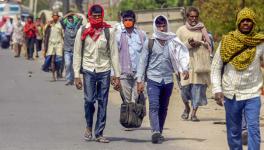COVID-19: 'We’re Suffering Without Support System', say Women Who Married for Love
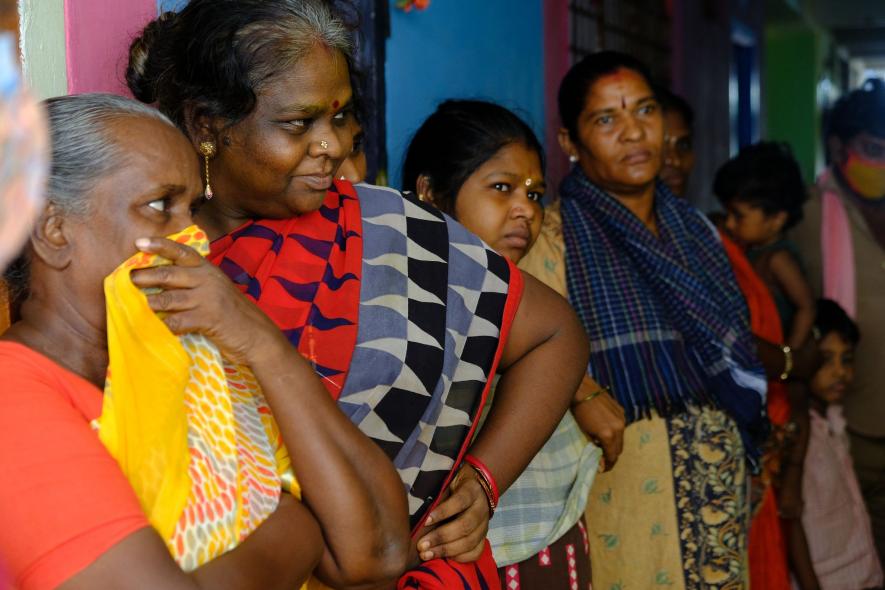
Perumbakkam slum resettlement colony residents
Chennai: The horror of ‘honour’ killings for inter-caste or inter-religion married couples keeps making headlines from time to time, but what happens to couples who survive such attacks? Those who are abandoned by their families?
People who fall in love and get married against the wishes of their families, in other words, ‘love marriage’ couples, face many hardships without a proper support system.
Without a family to fall back on for childcare, emotional needs and financial support, the suffering of women in such inter-caste love marriages has increased manifold during the pandemic.
Adding to their plight is the difficulty of procuring a ration card, without which they are denied subsidised ration provided through the public distribution system, as well as the recently doled out monetary relief and corona grocery kit by the state government..
Newsclick interacted with a few women in the Tamil Nadu Slum Clearance Board (TNSCB) tenement in Perumbakkam in South Chennai, who married for love, opposing their families.
NO INCOME, NO RELIEF, ONLY HUNGER
After 10 years of eloping from her maternal home, Prema now resides with her husband and four children in the Perumbakkam slum resettlement colony. Her husband, the breadwinner of the family, is a plumber and was out of work all through the COVID-19 lockdowns.
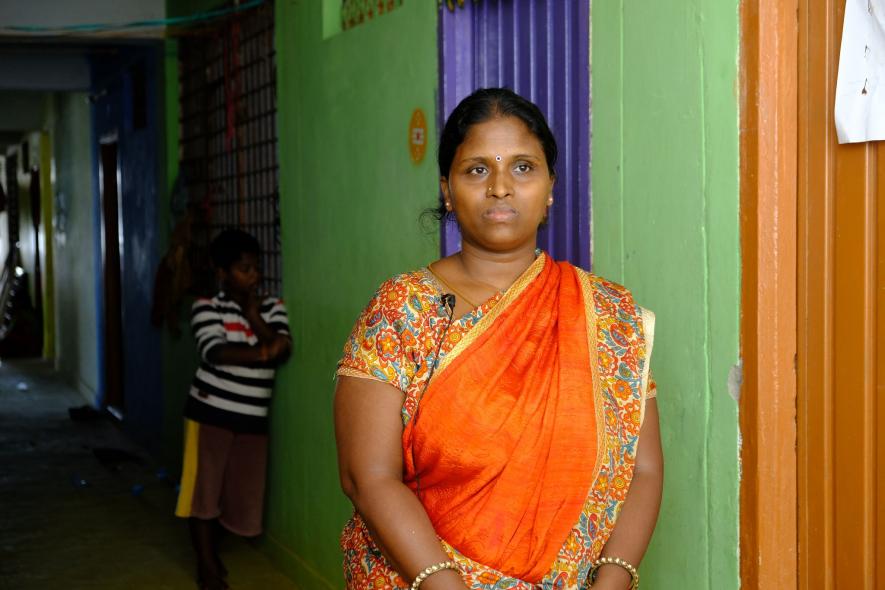
Prema: Deprived of ration card.
The majority of the slum clearance board tenants are daily wage workers and house-helps who lost their jobs during the pandemic and rely heavily on the ration distributed by the state government. Unfortunately, Prema does not receive government aid because she does not have a family ration card. Applying for a ration card involves both Prema and her husband talking to their respective parents and asking them to remove their names from the parental family cards, and that is not a possibility.
“Without proper income and government assistance, we had no option but to skip a few meals during the lockdown. If we have a meal or two to eat, we have no guarantee for the next,” says Prema.
Added to the burden, Prema cannot apply for a marriage certificate or a family ration card citing proof of residence. She lives in a house sublet by the original tenant and cannot claim residence.
“I have no family support, neither my mother nor my in-laws are in touch with us. My neighbours are helpful and regularly give us financial help and handouts. If we are kicked out of this settlement citing illegal occupation, we have nowhere to go, but on the streets” she adds.
MARRIED FOR LOVE, JILTED BY HUSBAND
Kalaiarasi, a 23 year single mother of two children, also ran away from home to marry the person she loved. Unfortunately, four years into the marriage, when she was conceived her second child, her husband abandoned her.
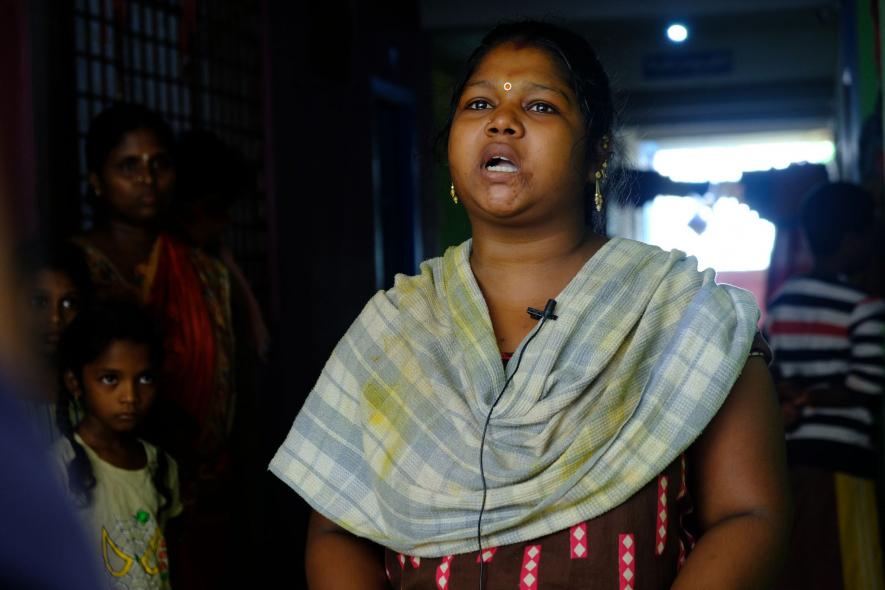
Kalaiarasi: A Struggling Single Mother
“I was working in two households and earning around Rs 3,000 each, but with the lockdown they told me not to come,” says Kalaiarasi.
“Now, I sell chicken pakora outside our building and earn Rs 150 a day. The police keep shooing me away, so I have to carry my utensils and run inside the building. I have to somehow feed my children and I am finding it very difficult”, says a tearful Kalaiarasi.
She says she has no support from her mother's side or her mother-in-law’s family. “All I want is to educate my children”, she adds.
Jayarani’s husband also abandoned her years ago, and she has been living alone since her daughter got married. Before the lockdown, she was working in three households and earning upto Rs 9,000 a month. She is now surviving on grains provided in the ration shop.
STRANGERS COME TO RESCUE
The women on each floor of the colony call each other “akka” (elder sister) and “amma” (mother) not merely for the sake of addressing one another, but they actually live as a family.
“Neither my husband nor I have families of our own. If these three akkas had not come to our rescue, I don’t know what would have happened to us”, says Devi, a young mother of three children, pointing to her floormates.
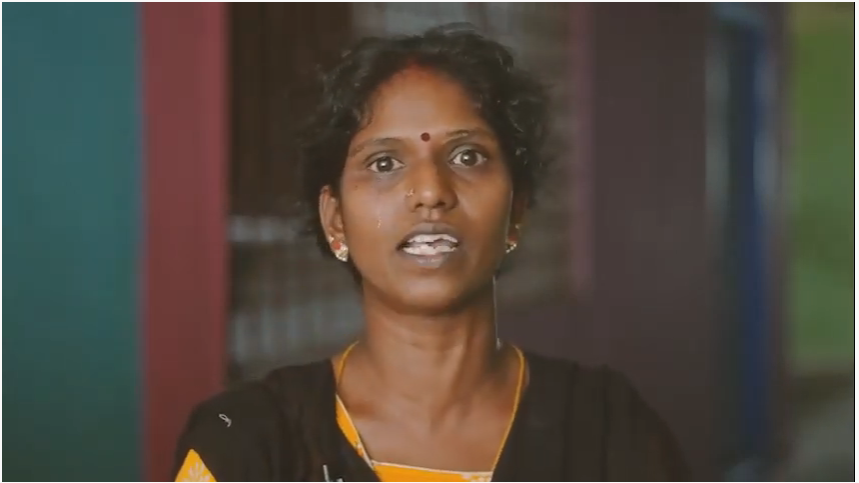
Devi: Living on the kindness of strangers
Narrating her life story, Devi says, “we were living on the street and running a small eatery on the roadside in Chintadripet. That’s when I met these three akkas, who are closer than family for me. They shifted to the slum resettlement colony and encouraged me to come, too, and I did, because I have no one else. They look after me like their own sister. Now that we have no income, these sisters are the ones feeding us and even providing clothing for my children” she adds.
These families, who are removed from the centre of the city and relocated 20 km away, say that they would have had some form of income during the pandemic had they not been pushed on the outskirts of the city.
They want the new government to give some permanent relief to their suffering. The women are also seeking education for their children, as since the onset of the COVID-19 lockdown, the colony’s children have had no formal education.
The Perumbakkam slum clearance board houses 12,000 families, each living on 390 sq ft houses, and the 12 families on each floor live as kith and kin. There are two other such settlements in Kannagi Nagar and Chemmenchery within a 6 km radius.
Get the latest reports & analysis with people's perspective on Protests, movements & deep analytical videos, discussions of the current affairs in your Telegram app. Subscribe to NewsClick's Telegram channel & get Real-Time updates on stories, as they get published on our website.


















